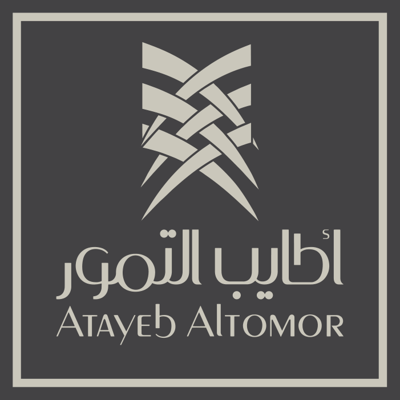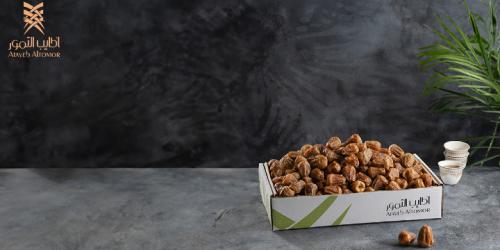About Us
Atayeb Altomor is the culmination of years of expertise and ongoing growth. Our story started in 1998 with individual initiatives to market the harvest of our late father, Sheikh Ibrahim Aldubikhi (may Allah have mercy on him), in Qassim region.
The official launch came in 2002 with the opening of our first store in Al-Rawdah district, Riyadh. Since then, our branches have grown, our reach has expanded, and today, our premium date products are enjoyed in over 100 countries—and counting. Driven by an ambitious vision, Atayeb Altomor continues its strategic expansion with a commitment to offering exceptional and diverse date varieties.
Our Core Product: Dates—A Legacy Rooted in the Arab World
The date palm is the Arab world's foremost tree—a timeless companion through every era and stage of life. Its roots in the arid lands of Arabia run so deep that its true origin is nearly impossible to trace. This blessed tree has spread far and wide across the Arab world, journeying with Arab tribes during their migrations and conquests, taking root wherever they settled. It is not just a tree; it is a symbol of resilience, heritage, and identity.
For generations, the palm tree stood by the Arabs through the harshest of times—offering them nourishment, shelter, and shade. It gave rise to lush gardens in barren lands and became an inseparable part of their daily lives, homes, culture, and knowledge. Their poets praised it, their sages admired it, their stories echoed its virtues, and their ancient carvings and artwork preserved its legacy. Remarkably, it is the only tree mentioned in all three divine scriptures: the Torah, the Bible, and the Holy Qur’an.
Nowhere is the date palm more deeply rooted than in the Kingdom of Saudi Arabia. Saudi Arabia is renowned for its vast palm groves, thanks to its expansive lands and dry climate—perfectly suited for cultivating date palms. From Riyadh and Qassim to Alahsa, AlUla, Hail, Aljouf, Bisha, Wadi Aldawasir, Shaqra, and Ushaiqer, palm trees flourish across the country, shaping its landscape and enriching its agricultural heritage.
With palm cultivation spread across so many regions, Saudi Arabia has become famous for its seasonal date markets—each offering a rich variety of premium dates. Among the most renowned are the Buraydah Date Market, Riyadh Date Market, Madinah Date Market, Unaizah Date Market, Alahsa Date Market, and Hail Date Market. Every region takes pride in its own market, each brimming with luxurious and diverse date selections.
The date palm remains the queen of trees in Saudi Arabia—a timeless symbol of generosity, patience, resilience, adaptability, and dignity. Its significance reflects the deep-rooted heritage of Saudi society, serving as a living emblem of its authenticity and pride. This symbolic value is why the palm tree features prominently in the official identity of the Kingdom, representing the enduring bond between the land, the tree, and the Saudi people. In recognition of its cherished status, Saudi Arabia has established a dedicated national center to support the palm sector, promote research and innovation, and expand both cultivation and marketing efforts.
As for its fruit, the date is the crown jewel of Saudi Arabia’s produce—and one of its most valuable national treasures, both historically and today. Dates are a cornerstone of the Kingdom’s food security for two key reasons: first, they are a purely local crop, requiring no foreign input; and second, they are a complete, self-sufficient food that needs no preparation, cooking, or additives. Beyond their nutritional importance, dates are also among Saudi Arabia’s top exports and a vital source of competitive national income.
With the growth of date-based industries and the rapid advancements in both local and global food manufacturing, dates have become one of the most important raw ingredients in the production of a wide range of products. Whether it is date paste, powder, natural sugar, or syrup (honey), every form of the date is now utilized to create innovative and high-demand food items across the market.

